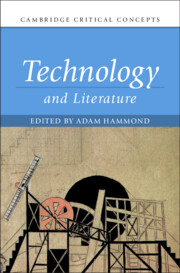Book contents
- Technology and Literature
- Cambridge Critical Concepts
- Technology and Literature
- Copyright page
- Contents
- Figures
- Contributors
- Timeline
- Introduction
- Part I Origins
- Chapter 1 Orality and Writing
- Chapter 2 Manuscript
- Chapter 3 The Hand Press, 1450–1800
- Chapter 4 The Mechanical Press, 1800–1900
- Chapter 5 The Typewriter
- Chapter 6 Literature in the Electric Age
- Chapter 7 Digital Text
- Part II Developments
- Part III Applications
- Index
Chapter 1 - Orality and Writing
from Part I - Origins
Published online by Cambridge University Press: 30 November 2023
- Technology and Literature
- Cambridge Critical Concepts
- Technology and Literature
- Copyright page
- Contents
- Figures
- Contributors
- Timeline
- Introduction
- Part I Origins
- Chapter 1 Orality and Writing
- Chapter 2 Manuscript
- Chapter 3 The Hand Press, 1450–1800
- Chapter 4 The Mechanical Press, 1800–1900
- Chapter 5 The Typewriter
- Chapter 6 Literature in the Electric Age
- Chapter 7 Digital Text
- Part II Developments
- Part III Applications
- Index
Summary
This chapter opens the volume’s investigation of several major questions – What is technology? What is literary technology? Is literature a technology? – by responding to Walter Ong’s opposition of the naturalness of oral speech and the artificiality of “technologized” writing. It presents a historical overview of the consequences of the development of writing in the West. Considering indigenous texts by such Haida authors as Skaay and Ghandl, MacRae pushes against standard scholarly accounts of the teleological triumph of print that have served to provide “an intellectual bulwark for imperialism and colonialism.” MacRae positions orality and oral performance as rich and generative technologies whose complex affordances are impossible to render in other media: Writing and printing, he argues, “impact literature and culture” primarily “by leaving things out: gestures, colors, coughs, shouts, and murmurs, the sound of falling rain: the entire three-dimensional world of human experience.”
- Type
- Chapter
- Information
- Technology and Literature , pp. 17 - 44Publisher: Cambridge University PressPrint publication year: 2023

